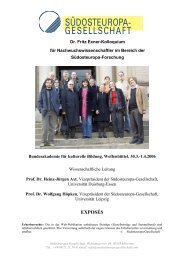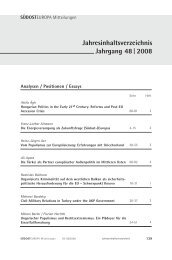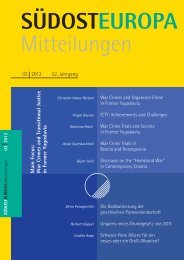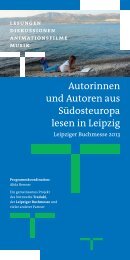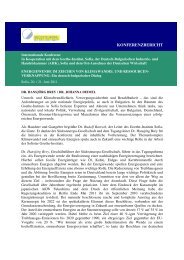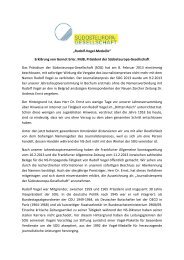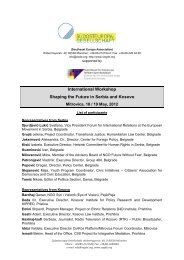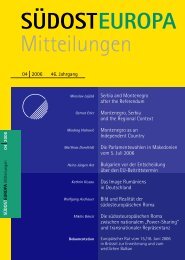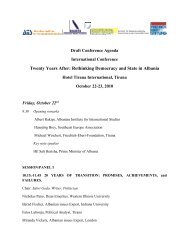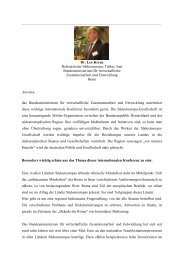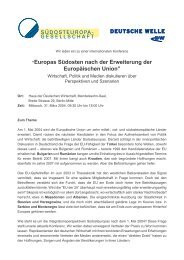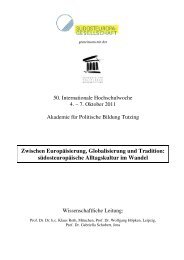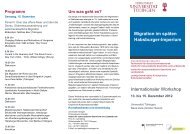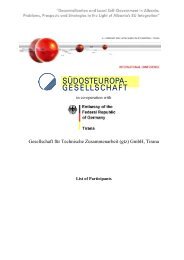Heft / Issue 05-06 - Suedosteuropa Gesellschaft
Heft / Issue 05-06 - Suedosteuropa Gesellschaft
Heft / Issue 05-06 - Suedosteuropa Gesellschaft
Create successful ePaper yourself
Turn your PDF publications into a flip-book with our unique Google optimized e-Paper software.
SÜDOST EUROPA<br />
Mitteilungen<br />
<strong>05</strong>-<strong>06</strong> 20<strong>06</strong> 46. Jahrgang<br />
SÜDOSTEUROPA Mitteilungen <strong>05</strong>-<strong>06</strong> 20<strong>06</strong><br />
<br />
<br />
<br />
<br />
<br />
<br />
<br />
Ditmar Staffelt<br />
<br />
<br />
Erhard Busek<br />
<br />
Cornelius Friesendorf <br />
Michael Raith<br />
Erwan Fouéré <br />
<br />
<br />
<br />
<br />
Heinz-Jürgen Axt /<br />
Oliver Schwarz<br />
<br />
<br />
<br />
Delina Binaj<br />
<br />
<br />
<br />
Edda Binder-Iijima <br />
<br />
<br />
<br />
Stefan Troebst <br />
<br />
<br />
<br />
<br />
Plädoyer für eine konsequente <br />
EU-Südosterweiterung<br />
<br />
The Energy Community Treaty: <br />
Securing the Energy Supply in <br />
Southeast Europe and in the EU <br />
<br />
Strategien gegen Menschenhandel <br />
in Südosteuropa<br />
<br />
Serbien zwischen europäischer <br />
Integration und nationalistischer <br />
Isolation<br />
<br />
Macedonia’s Perspective of EU <br />
Membership<br />
<br />
Szenarien zur Lösung der griechisch-<br />
mazedonischen Namensfrage <br />
<br />
<br />
<br />
Politische Partizipation von Frauen <br />
in Albanien <br />
<br />
<br />
Die Monarchie in Rumänien <br />
<br />
Geschichtsregion Schwarzmeerwelt
Inhalt<br />
<strong>05</strong>-<strong>06</strong> 20<strong>06</strong> 46. Jahrgang<br />
Analysen / Positionen / Essays<br />
8 Ditmar Staffelt<br />
Den Balkan integrieren: Plädoyer für eine konsequente<br />
EU-Südosterweiterung<br />
16 Erhard Busek<br />
The Energy Community Treaty: Securing the Energy Supply<br />
in Southeast Europe and in the EU<br />
22 Cornelius Friesendorf<br />
Strategien gegen Menschenhandel in Südosteuropa:<br />
zu wenig Prävention, Schutz und Zusammenarbeit<br />
36 Michael Raith<br />
Quo vadis Belgrad? Serbien zwischen europäischer<br />
Integration und nationalistischer Isolation<br />
50 Erwan Fouéré<br />
Macedonia’s Perspective of EU Membership<br />
56 Heinz-Jürgen Axt / Oliver Schwarz<br />
„Denn nur der Name ist mein Feind” – Alternative Szenarien<br />
zur Lösung der griechisch-mazedonischen Namensfrage<br />
68 Delina Binaj<br />
Die politische Partizipation von Frauen in Albanien<br />
78 Edda Binder-Iijima<br />
Die Monarchie in Rumänien – Zur europäischen Einordnung<br />
einer südosteuropäischen Institution<br />
92 Stefan Troebst<br />
Geschichtsregion Schwarzmeerwelt
<strong>05</strong>-<strong>06</strong> 20<strong>06</strong><br />
103 Forum<br />
Berichte<br />
1<strong>05</strong> Regional Cooperation Challenges 2007 / 2008. From the<br />
Stability Pact for South Eastern Europe to the Regional<br />
Cooperation Council: Enhancing the Voice of the Region.<br />
Zagreb, 8-9 September 20<strong>06</strong><br />
119 Sicherung der Energieversorgung: Energiegemeinschaft<br />
Südosteuropa und EU. Tutzing, 20.-22. Oktober 20<strong>06</strong><br />
124 Der Westliche Balkan. Politische Ordnung, wirtschaftliche<br />
Stabilität und internationales Engagement: Mazedonien.<br />
Berlin, 27. Oktober 20<strong>06</strong><br />
129 Müll ohne Ende? – Zur Problematik der Abfallwirtschaft in<br />
Rumänien. Sibiu / Hermannstadt, 14.-16. Juni 20<strong>06</strong><br />
133 Rezensionen<br />
S. Tornow: Was ist Osteuropa? Handbuch zur osteuropäischen Text- und<br />
Sozialgeschichte von der Spätantike bis zum Nationalstaat D. Dahlmann (Hrsg.):<br />
Hundert Jahre Osteuropäische Geschichte K. Nehring (Hrsg.): Südost-Institut<br />
München 1930-20<strong>05</strong> M. Olhausen: Politische Kommunikation im Wandel. Die<br />
deutschsprachige Presse des (ehemaligen) Ostblocks zwischen 1980 und 2000<br />
W. Borodziej / H. Duchhardt / M. Morawiec / I. Romsics (Hrsg): Option Europa.<br />
Deutsche, polnische und ungarische Europapläne des 19. und 20. Jahrhunderts<br />
R. Caplan: Europe and the Recognition of New States in Yugoslavia<br />
R. Friedrich: Die deutsche Außenpolitik im Kosovo-Konflikt G. Scotto:
<strong>05</strong>-<strong>06</strong> 20<strong>06</strong><br />
Friedensbildung in Mostar. Die Rolle der internationalen NRO A. Barber-<br />
Kersovan: Vom „Punk-Frühling“ zum „Slowenischen Frühling“ Î. Andrija‰eviç /<br />
·. Rastoder: Istorija Crne Gore – od najstarijih vremena do 2003 [Montenegros<br />
Geschichte – von den ältesten Zeiten bis 2003] P. Schubert: Albanische<br />
Identitätssuche im Spannungsfeld zwischen nationaler Eigenstaatlichkeit und europäischer<br />
Integration S. Voell: Das nordalbanische Gewohnheitsrecht und seine<br />
mündliche Dimension D. Halili: Wirtschaftswörterbuch Deutsch-Albanisch<br />
Österreichisches Ost- und Südosteuropa-Institut (Hrsg.): Entwicklung der ethnischen<br />
Struktur des Banats 1890-1992 J. Sallanz (Hrsg.): Die Dobrudscha:<br />
Ethnische Minderheiten – Kulturlandschaft – Transformation W. Roth: Gesang<br />
der Fischer. Als Arzt im Donaudelta E. Schlattner: Das Klavier im Nebel<br />
J. Schneider: Der Hermannstädter Metropolit Andrei von Øaguna<br />
T. Nikolaou: Die Orthodoxe Kirche im Spannungsfeld von Kultur, Nation und<br />
Religion W. Maul: Das war der alte Balkan – mögliche und unmögliche<br />
Geschichten<br />
165 Jahresinhaltsverzeichnis 20<strong>06</strong>
Editorial<br />
Sehr geehrte Leserin, sehr geehrter Leser,<br />
für Deutschland und die Europäische Union wird der 1. Januar 2007 ein bedeutender<br />
Meilenstein sein. Mit dem Beitritt Bulgariens und Rumäniens vollzieht die EU einen weiteren<br />
großen Schritt bei ihrer Südosterweiterung. Deutschland übernimmt für sechs Monate die<br />
EU-Ratspräsidentschaft und sieht sich dabei mit enormen Erwartungen konfrontiert. Nicht<br />
zuletzt sollen endlich Fortschritte bei der Einigung auf grundlegende institutionelle<br />
Reformen (Stichwort: Europäische Verfassung) erreicht werden. Solche Reformen erklärte die<br />
Europäische Kommission in ihrer im November 20<strong>06</strong> veröffentlichten Erweiterungsstrategie<br />
zu einer Voraussetzung für die Aufnahme neuer Mitglieder. Schon deshalb wird somit auch<br />
die EU-Südosterweiterung zu einem Thema der deutschen Ratspräsidentschaft werden.<br />
Für eine „konsequente EU-Südosterweiterung“ plädiert Ditmar Staffelt, Mitglied des<br />
Deutschen Bundestags, in seinem programmatischen Beitrag. Die Aufgabe der deutschen<br />
EU-Ratspräsidentschaft bestehe darin, „gleichzeitig Wege aus der Verfassungskrise aufzuzeigen<br />
und Vorschläge zu entwickeln für eine Zukunftsstrategie der EU einschließlich der<br />
Südosterweiterung“. Sein Argument: „Die sicherheitspolitischen Kosten der Nicht-Integration,<br />
die Verantwortung der Europäischen Union als Akteur in der Region, die historische und<br />
kulturelle Nähe Westeuropas zum westlichen Balkan, und die Frage des europäischen<br />
Selbstverständnisses, all dies sind gewichtige Punkte, die für eine EU-Südosterweiterung<br />
sprechen.“ Staffelts Fazit: „Der westliche Balkan gehört zu Europa und seine Länder mittelfristig<br />
auch in die EU. Deutschland muss Motor des EU-Integrationsprozesses bleiben.“<br />
Dass Integration und Kooperation für alle Beteiligten ein Gewinn sein kann, dies soll sich am<br />
„Energy Community Treaty“ zeigen, mit dem sich der Sonderkoordinator des Stabilitätspakts<br />
für Südosteuropa, Erhard Busek, in seiner Analyse befasst. Die am 1. Juli 20<strong>06</strong> in Kraft<br />
getretene Energiegemeinschaft zwischen der EU und den Staaten Südosteuropas will die<br />
Energieversorgung in Südosteuropa stabilisieren, optimieren und diversifizieren, und zugleich<br />
die Sicherheit der Energieversorgung in den EU-Staaten erhöhen. Die Vertragsstaaten in<br />
Südosteuropa haben sich dabei verpflichtet, wichtige Reformschritte im Energiebereich<br />
konkret und rasch umzusetzen und dabei effektiv miteinander zu kooperieren. Die Energiegemeinschaft<br />
schafft damit quasi einen Raum, in dem Reformen unmittelbar und unabhängig<br />
vom Stand der EU-Integrationsstufe des jeweiligen Landes vollzogen werden können<br />
und müssen.<br />
Das vorliegende Doppelheft der Südosteuropa Mitteilungen bietet Ihnen als Leser/in wieder<br />
eine Fülle von Beiträgen, die sich überwiegend mit Grundsatzthemen der Region befassen.<br />
An dieser Stelle wollen wir uns besonders bei unseren Autoren bedanken. Oft stehen wir in der<br />
Redaktion vor der „Qual der Wahl“ aus einer Fülle eingereichter bzw. angebotener Beiträge –
eine Tatsache, die für manchen am Ende abgewiesenen Autor bitter, der Qualität des<br />
Endprodukts aber sicherlich zuträglich ist. Ein besonderer Dank gilt auch den Verfassern von<br />
Buchrezensionen. Sie erschließen unseren Lesern die nach wie vor große Fülle von (meist)<br />
lesenswerter Literatur über und aus Südosteuropa.<br />
Zu Beginn des Jahres 2007 müssen wir die Verkaufspreise für die Südosteuropa Mitteilungen<br />
nach vielen Jahren Preisstabilität leicht auf 60 Euro (Abonnement) bzw. 12 Euro (Einzelheft)<br />
erhöhen. Diese Erhöhung wird durch die auch für uns konstant gestiegenen Produktionskosten<br />
notwendig und geht im Übrigen parallel zu einer Erhöhung der Mitgliedsbeiträge der<br />
Südosteuropa-<strong>Gesellschaft</strong>. Wir hoffen sehr, dass Sie uns als Leser/in die Treue halten werden.<br />
Eine anregende und aufschlussreiche Lektüre wünscht Ihnen<br />
Ihre Redaktion<br />
Hansjörg Brey<br />
Claudia Hopf
SÜDOSTEUROPA<br />
Mitteilungen<br />
Zeitschrift der Südosteuropa-<strong>Gesellschaft</strong><br />
Summaries <strong>Heft</strong> <strong>05</strong>-<strong>06</strong>/20<strong>06</strong><br />
46.Jahrgang<br />
Ditmar Staffelt<br />
Integrating the Balkans: A Plea for a Coherent South Eastern<br />
Enlargement of the European Union<br />
Germany will hold the presidency of the European Union starting from January 2007.<br />
The main challenges which Germany will have to tackle are the so-called<br />
“enlargement fatigue” together with the constitutional crisis within the EU. For both, it<br />
is necessary to go back to the original idea of the European Union: peaceful political<br />
cooperation and economic development.<br />
As far as the integration of the Western Balkans is concerned, two major<br />
achievements in the region give rise to hope: first, the SEEFTA (South East Europe<br />
Free Trade Agreement) has been created and should be ratified soon; second, the<br />
“Energy Community Treaty” between South Eastern Europe and the EU has come<br />
into being in 20<strong>06</strong>. These offer a good basis for economic development in the region.<br />
The perspective of accession to the European Union is also the strongest incentive<br />
for democratic movements in the region. At the same time the European Union<br />
should insist that there will be no accession to its structures without a complete<br />
fulfilment of its economic and political conditions. Germany’s commitment to the<br />
integration of the Western Balkans is expressed in its support of the Stability Pact for<br />
South Eastern Europe, among many other efforts to support these countries.<br />
Germany should continue to lead the region on its way to the European Union and<br />
place the subject on the agenda of the EU presidency.<br />
Erhard Busek<br />
The Energy Community Treaty: Securing the Energy Supply in<br />
Southeast Europe and in the EU<br />
The Energy Community Treaty (ECT) that has entered into force on 1 July 20<strong>06</strong> has<br />
set up a legal framework that enhances security of energy supply both in South<br />
Eastern Europe and in the EU by creating competitive energy markets compatible<br />
with sustainable development. The initiative has been launched as a prerequisite to<br />
maintain social cohesion in South Eastern Europe and to meet the future demand for<br />
energy resulting from economic growth.<br />
The challenges that the EU will be facing in the future in the field of energy security<br />
are manifold: Infrastructure is ageing and needs to be replaced; the dependency on<br />
import of primary fuels is growing and these are concentrated in only a few countries;<br />
world energy demands and energy prices are still rising; the growth in energy
2<br />
consumption means a further boost in the emission of greenhouse gases. In order to<br />
address these challenges, the European Commission is following an energy strategy<br />
that rests on five pillars: the creation of competitive internal energy markets; the<br />
diversification of the energy mix; suppliers and supply routes; enhancing energy<br />
efficiency and saving; enhancing solidarity (in order to prevent and eventually<br />
manage energy supply crises); and enhancing a coherent external energy policy.<br />
The Energy Community Treaty shows that countries in South Eastern Europe can<br />
successfully work together and thus gives regional co-operation true credibility.<br />
Cornelius Friesendorf<br />
Strategies Against Human Trafficking in Southeast Europe: A Lack<br />
of Prevention, Protection and Cooperation<br />
The trafficking of women and girls for the purpose of sexual exploitation has become<br />
a prominent European security concern. Over recent years, governments,<br />
international organizations and non-governmental organizations have been<br />
implementing numerous programs in Southeast Europe against sex trafficking.<br />
The article examines the shortcomings of counter-trafficking efforts. One problem is<br />
that counter-trafficking has focused on coercion, neglecting the prevention of<br />
trafficking. Wealthy countries of destination have been primarily fighting illegal<br />
migration and organized crime, instead of mitigating poverty, social exclusion and<br />
other socio-economic root causes of trafficking. Another problem is that law<br />
enforcement in Southeast Europe and the EU has often victimized trafficked persons.<br />
Last, anti-trafficking actors fiercely compete for funding and influence and have thus<br />
often failed to coordinate their activities. Much needs to be done for anti-trafficking<br />
efforts to be more effective, efficient and just.<br />
Michael Raith<br />
Quo vadis Belgrade? Serbia between European Integration and<br />
Nationalist Isolation<br />
20<strong>06</strong> has been a very decisive year for Serbia. At the beginning of May, the EU<br />
suspended the negotiations about a Stabilization and Association Agreement due to<br />
Belgrade’s failure to hand over war crimes fugitive Ratko Mladic to the International<br />
Criminal Tribunal for the Former Yugoslavia (ICTY) in The Hague. Only a few weeks<br />
later, Serbia was dealt another blow when Montenegro’s citizens decided to leave the<br />
State Union with Belgrade. In addition to that, Prishtina has been steadily gearing up<br />
for independence, with international pressure rising on Belgrade to come to terms<br />
with the ultimate loss of Kosovo.<br />
In defiance of these developments, however, the country’s newly adopted<br />
constitution refers to Kosovo as an integral part of Serbia. Threatened by a nationalist<br />
backlash in the case of Kosovo’s independence, the country has indeed reached the<br />
most important political crossroads since the fall of the Milosevic-regime six years<br />
ago. In light of the upcoming parliamentary and presidential elections, it is now up to<br />
Serbia’s democratic forces and her people to decide whether Belgrade will continue<br />
on the path to Euro-Atlantic integration or walk in the other direction, opting for
3<br />
nationalist isolation and a pariah status within an integrating Europe.<br />
Erwan Fouéré<br />
Macedonia's Perspective of EU Membership<br />
The perspective of EU membership has proven to be a most effective instrument to<br />
sustain stability and to achieve much needed reforms in Macedonia like in the whole<br />
Southeast European region. Macedonia serves as an example for the rest of the<br />
region – barely five years after a grave conflict it was granted candidate status to join<br />
the EU. The EU’s decision taken in December 20<strong>05</strong> to grant candidate status was<br />
recognition of the commitment of the country’s leaders to fully implement the Ohrid<br />
Framework Agreement and progress achieved in that respect. However, much effort<br />
is required to ensure continued inter-ethnic cooperation. Only through a continuous<br />
dialogue a broad consensus on crucial reforms can be attained.<br />
In a number of areas Macedonia still needs to deliver on its reform agenda: the full<br />
implementation of judicial reforms; fight against corruption; economic and<br />
administrative reforms. The country needs to get rid of an unhealthy degree of party<br />
influence over vital areas of society and in particular the economy. It should also<br />
remain fully committed to regional cooperation.<br />
The EU, meanwhile, will continue its support programmes that cover all vital sectors<br />
targeted for reform. After all, it is very important that the enlargement perspective be<br />
upheld.<br />
Heinz-Jürgen Axt / Oliver Schwarz<br />
“It's Only Your Name That's My Enemy” – Scenarios for the<br />
Solution of the Greek-Macedonian Name Dispute<br />
Like Shakespeare’s “Romeo and Juliet”, the Greek-Macedonian name dispute<br />
belongs to the classics on the stage of politics. But in contrast to the well-known end<br />
of these two narrative characters, it is up to the decision-making of the real political<br />
actors in Greece and Macedonia to avoid such a kind of tragedy in the name dispute.<br />
Referring to the Macedonian position in this issue, a recent change has to be noticed:<br />
Since July 20<strong>06</strong>, a new conservative government rules the Western Balkans state.<br />
Using this change of administration as a starting point, the following article discusses<br />
several scenarios for the solution of the Greek-Macedonian name dispute. Reflecting<br />
the European integration process of Macedonia, three possibilities will be analyzed:<br />
The name dispute will be solved before the start of the EU negotiation talks, a<br />
solution will be found during these talks or the dispute will be solved after the entry of<br />
Macedonia into the European Union. Before the chances of realization of these three<br />
scenarios will be evaluated, the background of the Greek-Macedonian name dispute<br />
will be presented, the up-to-now approaches of the dispute will be described and the<br />
new positioning of Prime Minister Gruevski’s administration will be discussed.<br />
Delina Binaj
4<br />
The Political Participation of Women in Albania<br />
The low level of political participation of women in politics in Albania gives reason for<br />
concern. In the analyses, the situation of the political representation of women is<br />
described and different causes for the actual situation, like the lack of a coherent<br />
feminist movement, are discussed. Based on a comparison with the apparently high<br />
level of political emancipation of women during the time of the socialist regime, the<br />
paper argues that equal rights for women in politics have to be achieved and<br />
defended, not only in public but also in a private sphere in order to be sustainable.<br />
Nevertheless, traditional and patriarchal values, attitudes and behaviour are not only<br />
still very present in the rural areas of Albania today but seem to re-emerge also in the<br />
urban centres of the country, accompanying the process of modernization. Women,<br />
their role in the families and their situation in the society are particularly affected by<br />
these tendencies, which also limit their aspirations for equal participation in politics.<br />
The paper calls for a more comprehensive understanding of these phenomena and<br />
for adequate actions of the state, as well as of the society.<br />
Edda Binder-Iijima<br />
Monarchy in Romania – About the European Classification of a<br />
Southeast European Institution<br />
The European unification process, symbolized by the motto of the European Union<br />
„United in Diversity“, and the claim for forging a common destiny for the European<br />
peoples, while remaining proud of their own national identities and history, as stated<br />
in the preamble of the Treaty for a Constitution for Europe, means also a challenge<br />
for European historiography. Moreover, it leads to the question to what degree a<br />
country’s history is shaped by indigenous factors and mainstream European<br />
influences. A look into the development of the Romanian monarchy may exemplify<br />
how the old traditional institution of “The Prince” was transformed into a constitutional<br />
monarchy under the influence of the overall European constitutional process in the<br />
19th century. All newly established countries in South Eastern Europe were<br />
confronted with the simultaneous problems of state- and nation-building. To secure<br />
internal and external stability, the elites of Romania, Greece and Bulgaria adopted<br />
the model of a constitutional monarchy under a foreign ruler, also as a means to<br />
integrate themselves in a monarchical European community and to be treated on<br />
equal terms, a process with parallels to the present situation in Europe.<br />
The article discusses problems how in the case of Romania, the kings of a foreign<br />
dynasty – the Hohenzollern-Sigmaringen – contributed to the formation of a political<br />
system with a strong government impact and how nowadays, the royal legacy<br />
influences Romanian historiography and politics.<br />
Stefan Troebst<br />
The Black Sea World as Historical Region<br />
Among the various concepts of historical meso-regions, the “Black Sea World” is a<br />
fairly new one. Here, the British historian-turned-journalist Neal Ascherson paved the
5<br />
way with his bestseller ‘Black Sea’. Whereas Fernand Braudel has treated the Black<br />
Sea region as a mere annex of his “Mediterranean World”, other historians, like the<br />
Romanian Gheorghe Ion Brtianu, set out to construct a circumpontic region sui<br />
generis. In the 1990s, the Turkish historian Eyüp Özveren re-discovered Brtianu and<br />
incorporated his ideas in his own concept of a primarily mercantile and cultural “Black<br />
Sea World” in the “long” 19 th century. And recently, Charles King published the first<br />
comprehensive monograph entitled ‘The Black Sea. A History’.



